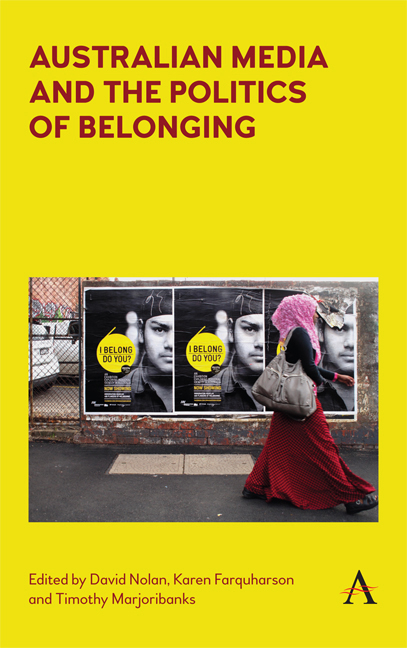Book contents
- Frontmatter
- Contents
- List of Illustrations
- Acknowledgements
- Part I THEORIZING BELONGING IN CONTEMPORARY AUSTRALIA
- Part II SUDANESE AUSTRALIANS, MEDIA PRACTICES AND THE POLITICS OF BELONGING
- Part III SHIFTING THE POLITICS OF BELONGING: MEDIA INTERVENTIONS AND POSSIBILITIES FOR TRANSFORMATION
- Chapter 8 Towards An Australian Framework For Best Practice In Reporting News Involving Muslims and Islam
- Chapter 9 Creating Media, Creating Belonging: Young People from Refugee Backgrounds and the Home Lands Project
- Chapter 10 Creating Belonging: The Possibilities and Limitations of an Organizational News Media Intervention
- Notes on Contributors
- Index
Chapter 9 - Creating Media, Creating Belonging: Young People from Refugee Backgrounds and the Home Lands Project
from Part III - SHIFTING THE POLITICS OF BELONGING: MEDIA INTERVENTIONS AND POSSIBILITIES FOR TRANSFORMATION
Published online by Cambridge University Press: 21 June 2018
- Frontmatter
- Contents
- List of Illustrations
- Acknowledgements
- Part I THEORIZING BELONGING IN CONTEMPORARY AUSTRALIA
- Part II SUDANESE AUSTRALIANS, MEDIA PRACTICES AND THE POLITICS OF BELONGING
- Part III SHIFTING THE POLITICS OF BELONGING: MEDIA INTERVENTIONS AND POSSIBILITIES FOR TRANSFORMATION
- Chapter 8 Towards An Australian Framework For Best Practice In Reporting News Involving Muslims and Islam
- Chapter 9 Creating Media, Creating Belonging: Young People from Refugee Backgrounds and the Home Lands Project
- Chapter 10 Creating Belonging: The Possibilities and Limitations of an Organizational News Media Intervention
- Notes on Contributors
- Index
Summary
Introduction
For young people from refugee backgrounds living in Australia, belonging is a complex and contentious issue. As permanent residents or citizens of Australia, they can lay claim to their formal right to belong to the nation. However, they also routinely encounter others within Australia who reject their claims to belong, usually because they look or sound ‘different’ (Fozdar and Hartley 2014). At the same time, they have been forcibly displaced from their countries of birth and are unlikely to be able to return, yet they remain connected to the people and places they left behind. Young people use a range of increasingly common communication technologies to keep in touch and engage with political events as well as with friends and family dispersed across the world (Wilding 2012; Gifford and Wilding 2013). This is a group for whom belonging is not produced through a simple convergence of geographic place, social group, national identity and sense of self. Rather, they live in one place while sustaining connections to other places, involving them in a complex process of creating what are necessarily contingent conditions of belonging.
We designed the Home Lands project (2009–13, supported by an ARC Linkage Project grant) with a team of partners (City of Melbourne, Cultural Development Network, Centre for Multicultural Youth, APC.au) in order to explore these processes of belonging. The central hypothesis that underpinned the project's design was that young people from refugee backgrounds might have more positive settlement outcomes in Australia if they could be supported in their connections with ‘home’ outside of Australia. This approach explicitly challenges the prevailing assumptions underlying current models of successful settlement: that refugee settlement rests on building a newlife in a newcountry (DIAC 2008; UNHCR 2012). The assumptions underpinning that approach do not deny the importance of maintaining ethnic and cultural ties and identities. However, they tend to articulate such identities as an important resource during early settlement that helps individuals adjust by acting as ‘a bridge between the old and the new’ (DIAC 2012, 4). In this respect, the prevailing model emphasizes the importance of settlers building their futures primarily by establishing ties and belongings to their newsettlement country, simultaneously assuming a process of discarding the connections with past places of residence.
- Type
- Chapter
- Information
- Australian media and the politics of belonging , pp. 159 - 176Publisher: Anthem PressPrint publication year: 2018



